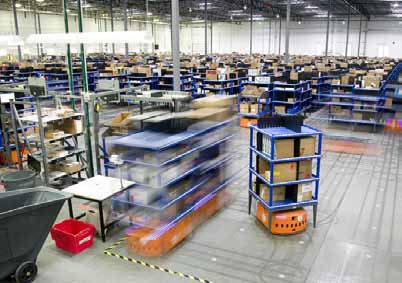 Paul Green |
The term warehouse automation can be used to describe the process of automating the storage and distribution of goods in a warehouse, using robots and centrally managed computer systems.
It is a term that we believe will become more important over time as companies start to focus more on systems rather than people.
The latest revolutionMany warehouses still do not have fully automated systems, but rely on pallet trucks and conveyor belts which need human involvement to be operated. However, times are changing and the use of robots in the materials handling and logistics industry is becoming increasingly popular.
Warehouses are now becoming more automated, which could mean that, in the future, warehouses will have less human contact - or possibly even none at all. Is this the industrial revolution of the 21st century?
Top companies like Amazon, IKEA and Zappos make good use of automated warehouse systems to keep their customers happy with easy and swift deliveries. This is extremely cost-efficient for these top companies (assuming you have the initial capital) as well as time-saving because it means that they do not have to spend considerable time employing and training staff to do jobs that the robots can handle.
Automation systemsThe most popular and one of the most advanced robotics systems at the moment is the Kiva robot, which has recently been bought by Amazon for $775 million.
 Kiva Systems uses a fleet of autonomous robots |
This robotics system has taken over the Amazon warehouses to allow for swift packaging and delivery services. The Kiva system aimed to reinvent the warehouse business, and it is doing just that. The robots work faster and more accurately than the average human being. This system allows the orders to be brought to the warehouse operator rather than having them go through the hassle of looking for the goods to be packed, as the robot finds the goods wherever they are in the warehouse.
There is a central computer to keep track of the location of each robot and each product. It acts as the dispatcher and the traffic controller at the same time. It's a bit like a real-life simulation game.
The system also keeps track of how items are stored in the warehouse. More popular items are stored towards the front of the packing stations and the less popular items are stored towards the back. Barcode stickers are read using in-built cameras. These robots work non-stop until they need a battery charge (or a short "nap").
This short
video shows how the Kiva System works in the Amazon warehouse. This is what really happens when you order a new product from Amazon, before it is delivered to your home.
Other warehouse automation systems include: Power Automation Systems, Keymas, Egemin, SSI Schafer and Vanderlande.
What do these systems mean in warehousing?These robotic systems present a lot of advantages for the materials handling and logistics industry. Sorting and packaging have now been made easier, and health and safety issues in the warehouses are reduced. These systems may also be cost-efficient in the long run.
However, the disadvantage is almost certainly unemployment. It means a lot of people will be out of work, or will not be able to acquire jobs in warehouses as these automation systems are in place. The disadvantages for the remaining employees could be that they are doing less dynamic, varied jobs as they become more subservient to the computer system.
What is the impact of automation?I suppose the key question to ask is: "If robots can improve the business, what is the human cost?" It is definitely a question to be pondered upon. Amazon says that it has hired more people since it implemented Kiva, so the loss of jobs will not happen anytime soon, hopefully. However, it's not clear if the hires are a direct result of the Kiva system - as we know, correlation and causation aren't the same thing.
Will forklift hire companies acquire automated systems in the near future? As we expand and grow, this is something that we should be looking into and considering at the very least. Is it worth the potential human cost? Do companies of a particular size lose their essence if they embrace automation? These are issues we should be talking about as we modernise, because modernisation in our industry is unavoidable.
Paul Green is the managing director and founder of
Hiremech Ltd, a forklift hire company in London. Hiremech is the exclusive dealer for the Caterpillar range of Forklift Trucks in London.